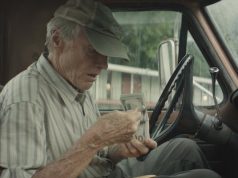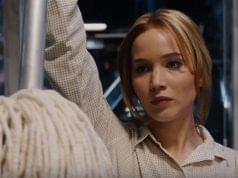
Because of her outlandish costumery and made-up name, it’s easy to dismiss Lady Gaga as a gimmicky pop star. What we discover in the sturdy, old-fashioned “A Star Is Born” (if we hadn’t already) is that she has a strong, beautiful singing voice and a natural presence as an actor. Her co-star, Bradley Cooper, making his debut as a director, frequently shoots in close-up, creating an intimate mood that suits the story of someone being introduced to a new world. As we follow Gaga’s character on her journey, we feel every emotion along with her
Gaga plays Ally, a waitress at an L.A. drag bar who sings now and then at the the drag queens’ request. Cooper plays Jackson Maine, a country-rock star who stumbles into the bar one night looking for a drink — he stumbles into a lot of places looking for drinks — and finds himself smitten with Ally and her voice. A little later, when she improvises a song for him during a quiet conversation, he becomes smitten with her songwriting abilities, too. These early scenes are casual, gently humorous, and enrapturing.
Ally lives with her widowed father, Lorenzo (Andrew Dice Clay!), a limo driver who loves his proximity to celebrities and is fond of telling people that someone once told him he sang better than Frank Sinatra. He and Ally both believe the only thing stopping her from being a star is that she’s not pretty enough, a notion that Jack finds preposterous. He invites her to his next show, then calls her up onstage to sing a chill-inducing duet of one of her songs, “Shallow,” which brings the house down and threatens to make the movie (and their relationship) peak early. Footage of the duet hits YouTube, and a star, as they say, is birthed.
Now, it’s not that for one star to rise another star must fall; it’s just that that’s how this story is usually told. Cooper’s version, which he wrote with Eric Roth (“Forrest Gump,” “Munich”) and Will Fetters (a frequent Nicholas Sparks adapter), is based on the 1954 and 1976 screenplays — both of which trace their origins to the 1937 version (which was about actors, not singers) — and it follows the same pattern. As Ally’s career begins, Jack’s starts to sputter because of his alcoholism and pill addiction. He’s losing his hearing, too, but refuses to take precautionary measures, despite the pleading of his much older half-brother, manager, and babysitter, Bobby (played by Sam Elliott, whose voice Cooper is imitating and who supplies some of the film’s most touching moments).
Though this is ultimately Ally’s story, it’s intertwined with Jack’s, and much of what happens to her is because of him. We learn more about his background than hers — she’s the new star who appeared out of nowhere; he’s the one with a biography. Much of Ally’s character arc relates to her learning the ropes of fame and love, being taught by someone who’s kind of bad at both, and Gaga’s unadorned performance grants us a close-up view of the world through her eyes. But her role isn’t merely to react to what the man in her life does. She declares early in their relationship that she won’t get on his motorcycle with him if he’s been drinking and won’t come looking for him when he goes on a bender. She doesn’t abide his drunken jealousies; she learns from them. As much as Jack is a mentor to her, he’d more of a cautionary tale, and she shrewdly absorbs everything.
Gaga’s powerhouse voice is one of the film’s key assets, and Cooper is no slouch either. Both sang live on set (as opposed to lip-synching), adding to the sense of intimacy, and that intimacy has a profound effect. This rarely feels like a glitzy showbiz drama, but like a personal, private story of two artists in love. When Ally performs on “Saturday Night Live,” we don’t see how it looks to the folks at home; we see it from the perspective of one watching closely from the wings or in the studio space. The adoring crowds are never the point for either of them, and the movie packs an emotional wallop by shutting all of that out and focusing on these two faces and voices.
B+ (2 hrs., 15 min.; )





